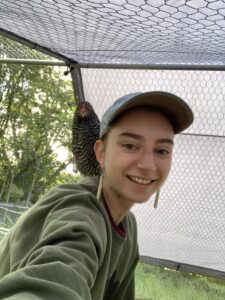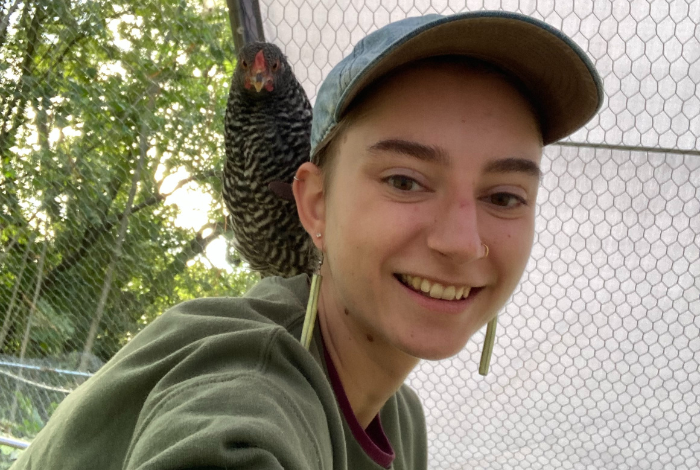Veronica Holst has spent the past six months traveling around the country and living on communal farms, and what all the farms they’ve been on have in common is a spirit of abundance and a desire to share the fruits of their labor.
This blog is part of the ongoing series, “Learn, Pray, Engage: Climate Justice: Seeking Shalom.”
 Veronica Holst Veronica grew up attending Landisville Mennonite Church in Lancaster, Pennsylvania. After earning a degree in Arts and Psychology from Eastern Mennonite University, she decided to travel across the United States in 2023 while learning and working on farms through the organization WWOOF (WorldWide Opportunities on Organic Farms). Veronica has embraced the experience as an opportunity for experiential learning, wisdom seeking, and spiritual connection.
Veronica Holst Veronica grew up attending Landisville Mennonite Church in Lancaster, Pennsylvania. After earning a degree in Arts and Psychology from Eastern Mennonite University, she decided to travel across the United States in 2023 while learning and working on farms through the organization WWOOF (WorldWide Opportunities on Organic Farms). Veronica has embraced the experience as an opportunity for experiential learning, wisdom seeking, and spiritual connection.
_________________________________________________
I’m writing this from a treehouse nestled in a California redwood forest, overlooking rows of raspberry, fava bean, and fruit-bearing citrus trees. This morning, mist has rolled in, and the forest is quiet, silent except for the calls of purple finches and the sounds of airplanes flying overhead. For the past six months or so, I’ve been traveling around the country, living and working on small farms and homesteads. I didn’t go to school for agricultural or environmental science, and I didn’t grow up on agriculture. But as I prepared to graduate from Eastern Mennonite University in May 2023, I felt a strong urge to spend more time in the soil and learn from people who actually practice simple, sustainable living.
The first farm I stayed at was an urban farm just outside of Raleigh, North Carolina. I quickly learned how important this farm is to the community around it. Every Wednesday and Saturday, a group of college students comes to the farm to help with ongoing projects and in return receive homemade pizza, fresh produce, and kombucha. Other people from the area—people looking for an opportunity to spend time outdoors, mothers with kids, neighbors, and other local farmers—also volunteer throughout the week. I’m grateful to have experienced this community and their mindset of abundance. It was a great example of how caring for the earth can foster relationships as well.
While the community was different at each farm I stayed at, this mindset of abundance and generosity was present everywhere. My host in Louisiana happily sent handfuls of surviving persimmons to visitors after a severe summer drought destroyed dozens of fruit trees. A farm worker in Georgia taught me how to cook over an open fire. He baked eggs for everyone for breakfast even when he didn’t have enough for himself, and was happy to share dishes made with the rabbits and squirrels he hunted. My host in Austin, Texas, brought bags of kale and arugula to share at a gathering of friends. They welcomed me into their Thanksgiving celebrations, even though I was a stranger, and prepared copious amounts of fresh vegetables and homemade granola for me as we headed to our next stop.
Now I’m at my eighth location, a permaculture farm in Watsonville, California, where the people who work here share that same generous spirit.
When I thanked one of them for sharing the food they had grown, they replied, “Of course. Food, like any other property, should be shared. If you don’t share it, what’s the point?”
This experience has been a continuing lesson for me in abundance and generosity, but more than that, it is a lesson in coexistence. My fellow farmers and the land remind me that caring for others and caring for yourself are often one and the same thing. I often remember when my host in Louisiana cut open a giant Chinese cabbage, handed me a delicate leafy sprout in the middle, and said, “This is chi! This is the life force energy in all things! Taste it.” I learned so much from him about the interconnectedness of all living things, and that even our thoughts are not isolated events. What is in our minds manifests in our actions, which in turn influences how we treat each other.
These farmers are both stewards and dreamers of the earth. They have a vision for the land they inhabit and hope for the community that has been and continues to be created by that space. They are also acutely aware of the weather patterns and signs of climate change that can easily create feelings of overwhelm and despair. Despite the fear and anxiety of climate change, they continue to nurture, nourish, and cultivate the chi that is within all of us. And it gives me great hope and inspiration to do the same.

As followers of Jesus, we seek God’s dream of shalom for all people and all creation, including the climate. Shalom We need to seek justice and healing in our relationship with God, with each other, and with the earth that sustains us.
Please join us for “Learn, Pray, Engage: Climate Justice: The Quest for Shalom.”
Please support Mennonite Church USA’s peace and justice efforts by donating here .
The views and opinions expressed in this blog are those of the author and do not necessarily represent the views of the MC USA Executive Board or staff.
Want to submit a blog post to Menno Snapshots? Please see our blog guidelines here.

